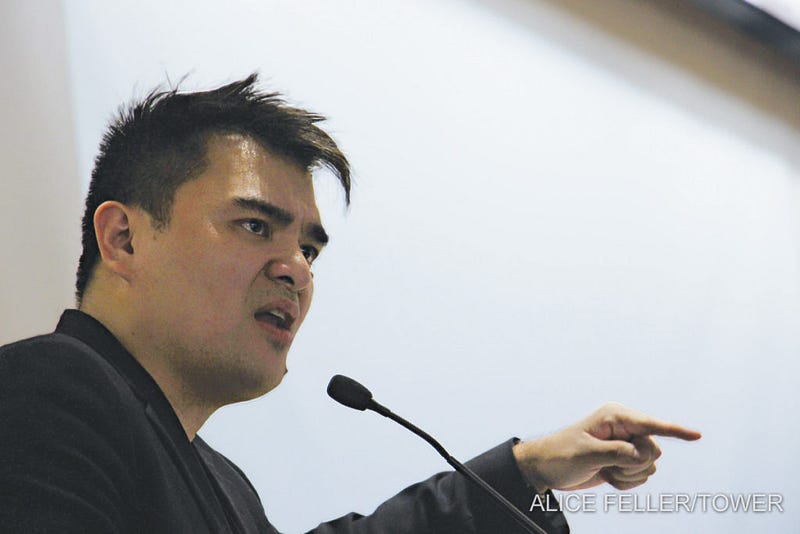Pulitzer Prize-winning undocumented journalist visits BCC to talk the morality of citizenship
Jose Antonio Vargas spoke to a rapt audience at Berkeley City College on Nov. 15 and challenged them to view citizenship in a whole new way.
Vargas first learned of his undocumented status when he tried to apply for a driver’s license as a high school student in Mountain View. Since then he has devoted himself to questioning American immigration law.
He frequently appears on the Bill O’Reilly show and other right-wing talk shows to argue his rights as a gay undocumented person of color.
On the steps of San Francisco City Hall he filmed a short documentary about coming out, which he showed at the BCC event. His subjects face the camera and one after another tell the viewers why they are coming out.
But the election of Donald Trump presents a new threat to many immigrants, especially those without papers. “What will you do when they start rounding us up?” he asks.
The 700,000 young people who registered in the DACA (Deferred Action for Childhood Arrivals) program are especially at risk for deportation. The DACA program offers short-term protection from deportation as well as the right to work.
Trump has vowed to end the program. Young people who counted on protection under DACA registered with the government, giving their names, addresses and dates of birth.
A Trump government can now use this personal information to go after the very people who trusted in the promise of protection when they turned over their personal information.
Even Obama, Vargas says, has deported 2.4 million immigrants since taking office — more than any president before him.

Vargas is outraged by the expectation that immigrants should earn their citizenship.
“This country decided that if you were born here you’re a citizen, “ he says. “I would call that small ‘c’ citizenship.”
“Big ‘C’ citizenship is when the government starts rounding up Muslims, undocumented people start showing up in solidarity.”
The right of citizenship was originally reserved for “free, white men of good moral character,” he said. He told the audience that Native Americans were denied citizenship until 1924.
Later he turned to the question of white people.
“How can we ask for empathy when we can’t give any back?” he asked. “How do we include white people in the conversation?”
His answer is “radical empathy,” a phrase that he repeated several times.
“Fifty-five percent of the total population growth of America came from immigrants,” he said. “In next 50 years even more will come from Latinos.”
To raucous applause he concluded, “White men are finding they are not the center of the universe.”
“Half of white Millennials believe white discrimination is as big a problem as other racism,” he said. “And do you know what the issue is? Scholarships!”
During the question and answer period a white woman said, “I’ve been to many different countries where my visa ran out and I had to leave, or I’d go to jail. I’d be in serious trouble.”
She continued, with evident difficulty. “I’m wondering what is the difference — “
He interrupted to rephrase her question: “Why do I get to flaunt my illegality while other people do it right in other countries?”
“Not exactly,” she said. “I love it that America is embracing — “
“I would argue,” he said, “that we are where we are in this country because of how we got here. We owe it to our history, that was built on the back of cheap free labor. You can’t have it both ways.”
He spoke of the Native Americans and the Chinese, their history and our culpability. “And NAFTA,” he added. “We don’t talk about the effect of NAFTA on Mexico.”
Vargas noted the U.S. role in migration. When he told an audience of white Republicans that there are 4 million Filipinos in the U.S. now, one of the audience members asked, “Why are there so many of you here?”
He replied, “Sir, we are here because you were there.”
Jose Antonio Vargas
Vargas was born in the Philippines. When he was 12 years old his mother sent him to live in Mountain View with his grandparents, both naturalized citizens of Filipino descent.
Vargas has written for the Washington Post, the New Yorker and the Huffington Post. He also contributed to a Pulitzer Prize-winning story by the Washington Post.
He is a full-time activist, working to advance the rights of undocumented immigrants in the U.S.
























